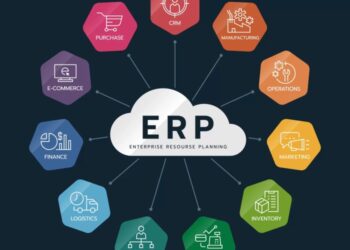Distribution ERP sets the stage for this enthralling narrative, offering readers a glimpse into a story that is rich in detail and brimming with originality. From understanding key features to exploring real-time data tracking, this topic delves deep into the realm of modern business operations.
Overview of Distribution ERP
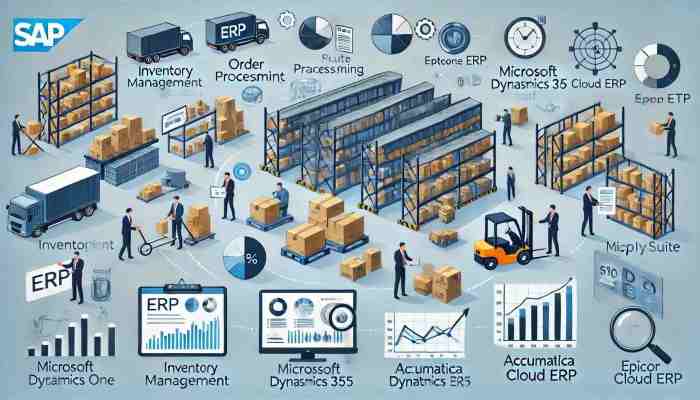
ERP (Enterprise Resource Planning) systems designed specifically for distribution companies are known as Distribution ERP systems. These systems are tailored to meet the unique needs of businesses involved in the distribution of goods and services.
Key Features of Distribution ERP Systems
- Inventory Management: Distribution ERP systems offer advanced inventory management capabilities to efficiently track and manage stock levels, reorder points, and warehouse locations.
- Order Processing: These systems streamline the order processing workflow, from order entry to fulfillment, ensuring accurate and timely deliveries to customers.
- Supply Chain Management: Distribution ERP systems optimize supply chain processes by facilitating seamless communication between suppliers, manufacturers, distributors, and retailers.
- Reporting and Analytics: Robust reporting and analytics tools provide real-time insights into key performance indicators, helping businesses make informed decisions.
- Integration Capabilities: Distribution ERP systems integrate with other business applications, such as CRM and e-commerce platforms, for a seamless flow of data across the organization.
Importance of Distribution ERP in Modern Business Operations
Distribution ERP systems play a crucial role in modern business operations by enhancing efficiency, improving decision-making, and fostering growth. By centralizing data and automating processes, these systems enable distribution companies to:
- Optimize Inventory Management: By providing accurate inventory visibility and control, Distribution ERP systems help minimize stockouts, reduce carrying costs, and improve order fulfillment rates.
- Enhance Customer Service: With streamlined order processing and quick access to customer information, businesses can deliver exceptional service and build long-lasting customer relationships.
- Increase Operational Efficiency: Automation of routine tasks, such as order entry and invoicing, frees up time for employees to focus on strategic activities, driving productivity and profitability.
- Gain Competitive Advantage: Distribution ERP systems enable businesses to adapt quickly to market changes, meet customer demands, and stay ahead of competitors in a dynamic marketplace.
Benefits of Distribution ERP
ERP software can bring numerous benefits to distribution companies, helping them streamline operations, improve efficiency, and enhance overall productivity. One of the key advantages of using Distribution ERP software is its ability to integrate various business processes into a centralized system, providing real-time visibility and control over all aspects of the supply chain.
Improved Efficiency in Supply Chain Management
- Automation of order processing, inventory management, and logistics coordination leads to faster order fulfillment and reduced lead times.
- Enhanced forecasting and demand planning capabilities help optimize inventory levels, minimizing stockouts and overstock situations.
- Integration with customer relationship management (CRM) systems enables better customer service and communication, leading to increased customer satisfaction and loyalty.
- Real-time data analytics and reporting provide valuable insights for decision-making, allowing companies to identify trends, optimize processes, and drive continuous improvement.
Companies Benefitting from Distribution ERP Solutions
- Amazon: The e-commerce giant utilizes Distribution ERP software to manage its vast network of warehouses and optimize order fulfillment processes, allowing for quick delivery times and high customer satisfaction.
- Walmart: The retail giant leverages ERP solutions to streamline its supply chain operations, from inventory management to transportation logistics, improving efficiency and reducing costs.
- UPS: The global logistics company uses Distribution ERP software to track shipments, optimize routes, and manage warehouse operations, ensuring timely deliveries and customer satisfaction.
- Coca-Cola: The beverage company relies on ERP systems to manage its distribution network, from production planning to delivery scheduling, ensuring product availability and customer service excellence.
Key Features of Distribution ERP

Distribution ERP systems are designed to address the specific needs of managing distribution processes efficiently. Below are the key features that a Distribution ERP system should have:
Real-Time Data Tracking
One essential feature of Distribution ERP systems is real-time data tracking. This allows companies to monitor their inventory levels, sales orders, and shipments in real-time. By having access to up-to-date information, businesses can make informed decisions quickly and effectively. Real-time data tracking also helps in identifying any issues or bottlenecks in the distribution process promptly.
Inventory Management
Distribution ERP systems streamline inventory management processes by providing tools to optimize stock levels, track inventory movements, and manage reorder points. With features like automated replenishment, barcode scanning, and warehouse management integration, businesses can ensure accurate inventory counts and minimize stockouts or overstock situations.
Supply Chain Visibility
Another crucial feature of Distribution ERP systems is supply chain visibility. These systems offer end-to-end visibility into the supply chain, enabling businesses to track products from suppliers to customers. By having a comprehensive view of the supply chain, companies can proactively address any issues, improve lead times, and enhance overall efficiency.
Order Management
Efficient order management is a key feature of Distribution ERP systems. These systems automate order processing, streamline order fulfillment, and provide tools for managing customer orders effectively
. By centralizing order management processes, businesses can reduce errors, improve order accuracy, and enhance customer satisfaction.Reporting and Analytics
Distribution ERP systems come equipped with robust reporting and analytics tools. These features allow businesses to generate custom reports, analyze key performance indicators, and track various metrics related to distribution operations. By leveraging data-driven insights, companies can identify trends, optimize processes, and make strategic decisions to drive business growth.
Implementation of Distribution ERP
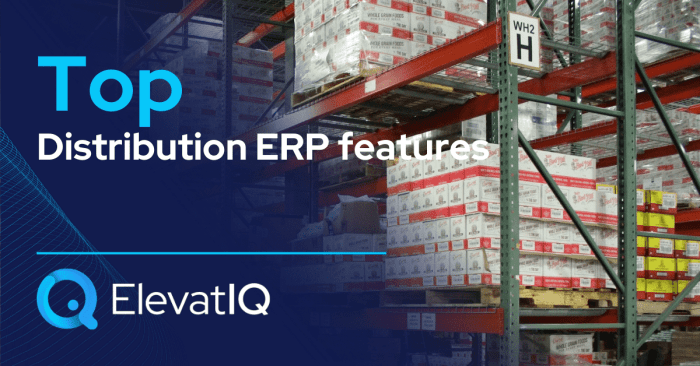
Implementing a Distribution ERP system can be a complex process that requires careful planning and execution. Here is a step-by-step guide on how to successfully implement a Distribution ERP system, along with common challenges faced and best practices for deployment.
Step-by-Step Guide for Implementation
- 1. Planning: Define your goals, objectives, and requirements for the Distribution ERP system. Create a project plan with timelines and milestones.
- 2. Vendor Selection: Research and select a reputable ERP vendor that specializes in distribution solutions.
- 3. Customization: Work with the vendor to customize the ERP system to meet your specific business needs and processes.
- 4. Data Migration: Transfer your existing data to the new ERP system, ensuring accuracy and integrity.
- 5. Training: Provide comprehensive training to your staff on how to use the new ERP system effectively.
- 6. Testing: Conduct thorough testing of the ERP system to identify and resolve any issues before full deployment.
- 7. Go-Live: Roll out the Distribution ERP system to your organization, ensuring minimal disruption to operations.
- 8. Evaluation: Continuously monitor and evaluate the ERP system's performance to make any necessary adjustments.
Common Challenges During Implementation
- - Resistance to Change: Employees may be resistant to adopting new processes and technologies.
- - Data Integration Issues: Integrating data from multiple sources can be challenging and may lead to inconsistencies.
- - Lack of Executive Support: Without strong leadership and support from management, the implementation process may face obstacles.
- - Budget Constraints: Limited budget allocation can impact the scope and quality of the ERP implementation.
Best Practices for Successful Deployment
- - Clear Communication: Ensure open and transparent communication with all stakeholders throughout the implementation process.
- - Change Management: Implement a change management strategy to address employee concerns and facilitate a smooth transition.
- - Data Quality Assurance: Prioritize data quality and accuracy to prevent errors and discrepancies in the ERP system.
- - Continuous Training: Provide ongoing training and support to users to maximize the benefits of the Distribution ERP system.
Last Point
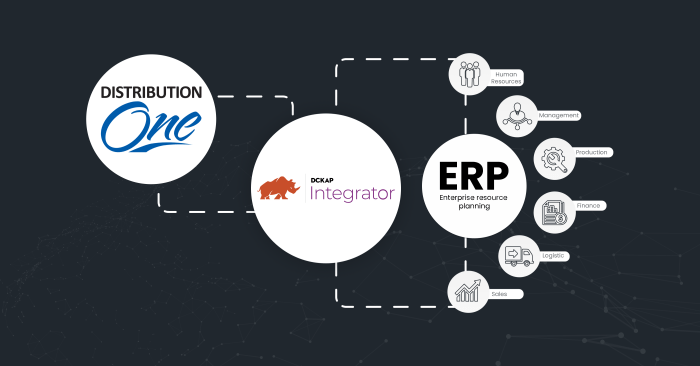
In conclusion, Distribution ERP plays a vital role in revolutionizing how businesses manage their supply chain and inventory processes. With its multitude of benefits and essential features, it's clear that embracing Distribution ERP can lead to enhanced efficiency and success in the competitive market landscape.
FAQ Compilation
What are the key features of Distribution ERP?
Key features include real-time data tracking, inventory management streamlining, and comprehensive reporting capabilities.
How can companies benefit from implementing Distribution ERP solutions?
Companies can experience improved efficiency, enhanced supply chain management, and better decision-making processes.
What challenges are commonly faced during the implementation of Distribution ERP software?
Common challenges include data migration issues, employee training needs, and resistance to change within the organization.
Why is real-time data tracking important in Distribution ERP systems?
Real-time data tracking allows for instant insights into inventory levels, customer demands, and overall business performance, enabling quick and informed decision-making.
What best practices should be followed for successful Distribution ERP deployment?
Best practices include thorough planning, engaging stakeholders early in the process, and providing adequate training and support for employees.

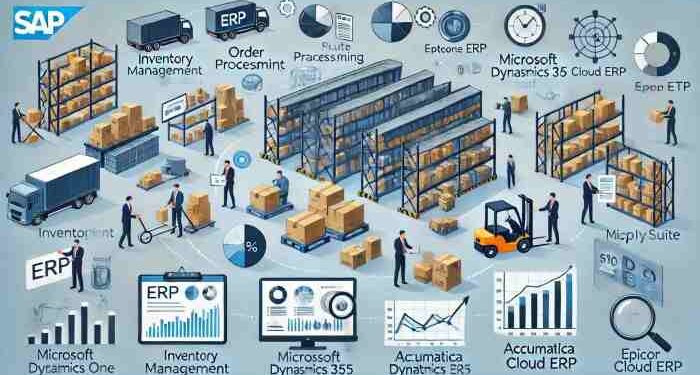
![Best Construction ERP Software [2024 Edition]](https://health.bandungnews.id/wp-content/uploads/2025/10/Top-10-Best-Construction-ERP-Software-to-Use-in-2024-1-75x75.jpg)





![Best Construction ERP Software [2024 Edition]](https://health.bandungnews.id/wp-content/uploads/2025/10/Top-10-Best-Construction-ERP-Software-to-Use-in-2024-1-120x86.jpg)


